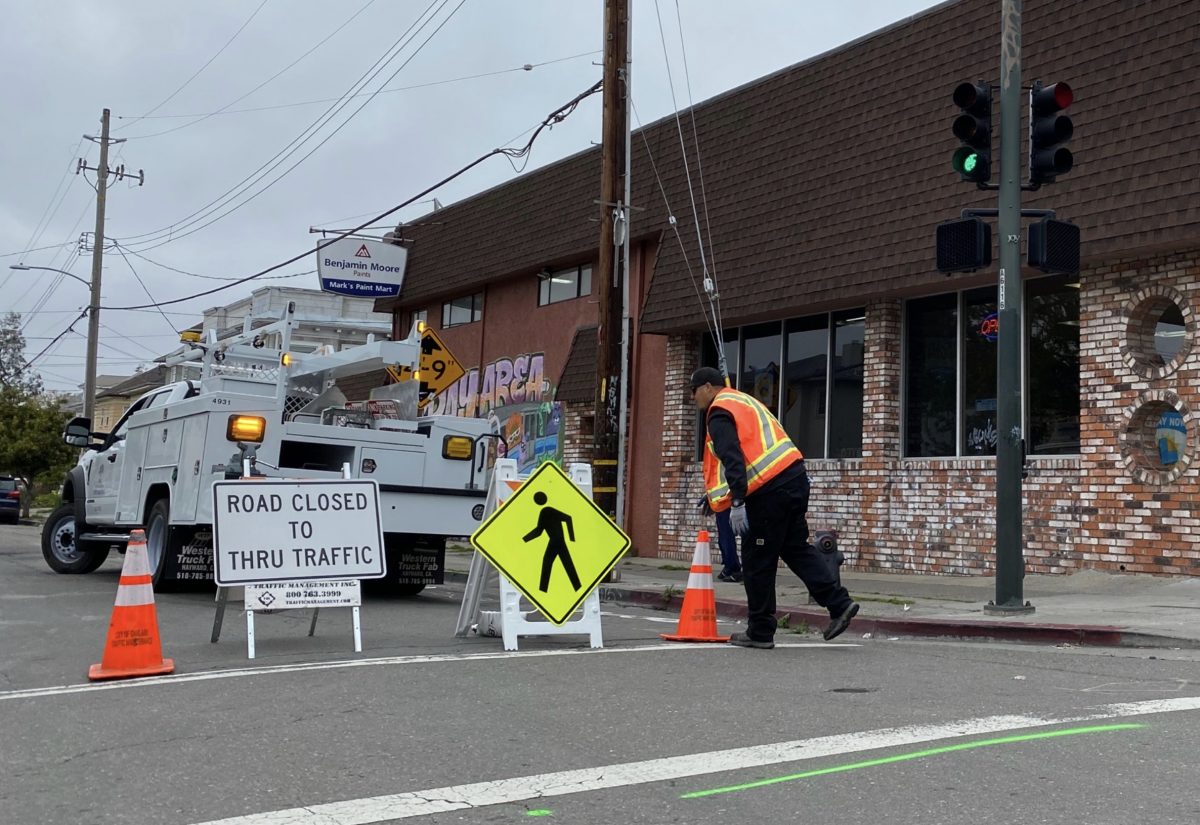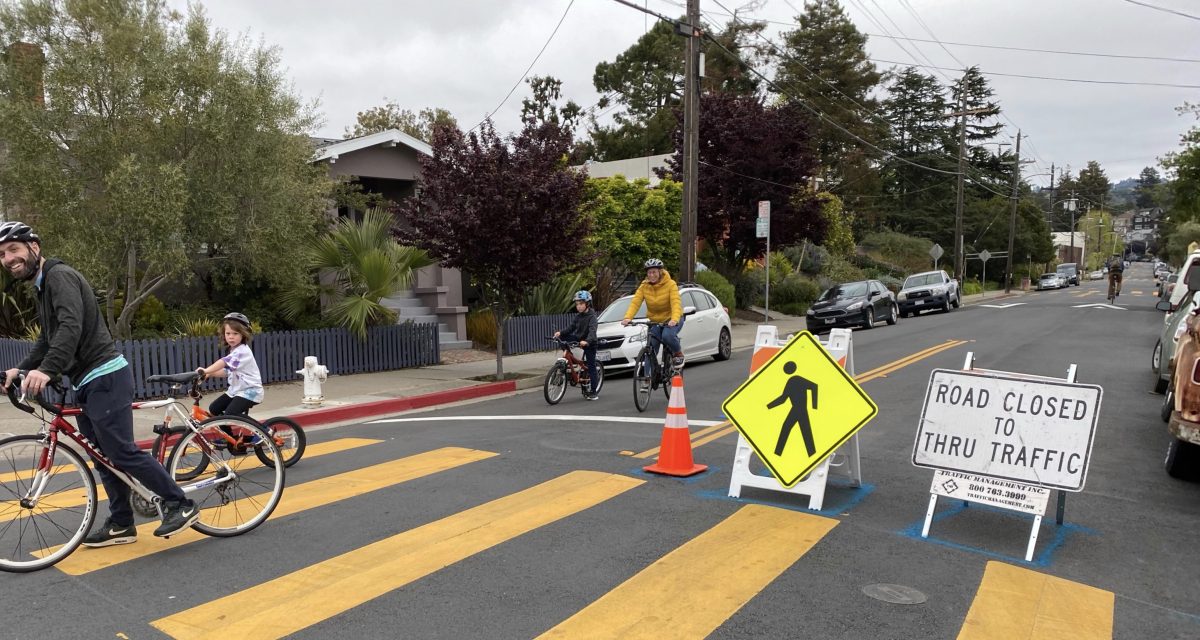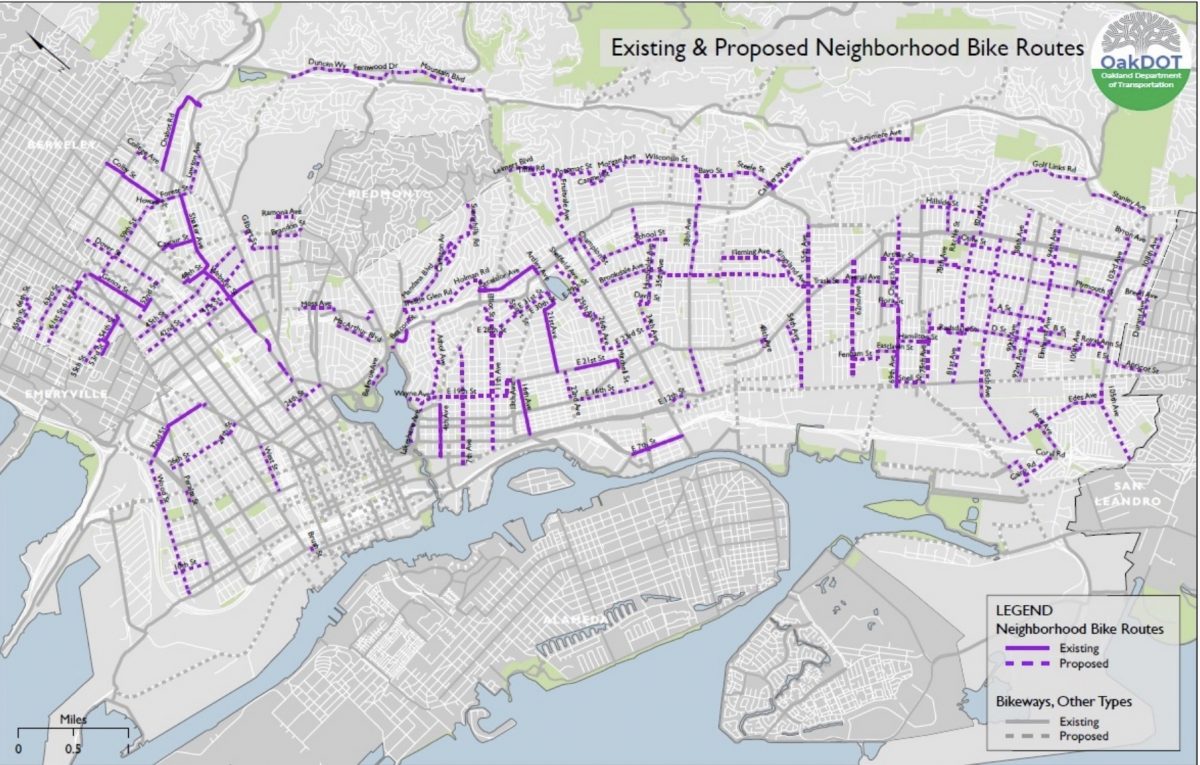
(Photo: City of Oakland)
As the City of Portland continues to ponder what — if anything — they’ll do to adapt streets to the Covid-19 outbreak, Oakland residents are already enjoying the fruits of their city’s decision.




On Friday we shared how the Mayor of Oakland had a much different reaction than Portland Mayor Ted Wheeler to the dramatic shifts in road usage and need for safe social distancing.
Oakland’s effort started Saturday with temporary barricades and cones being erected on a handful of streets. The city’s transportation department has also laid out details of their plans on their website. As I read through them, I was amazed at how many of the ideas mimic what we’ve been highlighting in the past month.
To refresh, Oakland plans to change 74 miles of neighborhood streets — about 10% of the city’s total — into “Slow Streets” where through driving traffic is no longer allowed. Based on photos from Oakland DOT, the changes are being made with barricades, traffic cones and the standard, “Road Closed to Through Traffic” signs placed at the beginning of each block.
The idea is to, “Discourage drivers from using Neighborhood Bike Routes unless necessary to reach a final destination… [so] that people can more comfortably use these low-traffic streets for physically distant walking, wheelchair rolling, jogging, and biking all across the City.”
There are four things that stand out to me in Oakland’s plan:


⇨ First, instead of worrying about how the public might misinterpret the changes, they’ve taken control of the messaging from the get-go. The writing on their website lays out the problem, avoids buzzwords and explains their rationale in clear and direct language. They are also explicit about what the plan doesn’t do: include police enforcement, limit emergency or transit vehicle access, or allow public gatherings of any size.
⇨ Second, they make it clear that the implementation of the changes is being done with existing social and economic disparities in mind. “The City will prioritize posting signage on routes in underserved communities,” their website reads. OakDOT also points out the fact that the virus crisis makes existing inequities — like low-wage earners and people unable to work from home or neighborhoods that have no park space — worse. “OakDOT seeks to reduce barriers to opportunities for physical activity and ensure safe transportation for our most vulnerable community members.”
⇨ Third, OakDOT is empowering the community to help. They tell people to download a new sign (not yet available) and post it along Slow Street corridors and spread the #OaklandSlowStreets messages on social media.
⇨ And finally, what I like about Oakland’s approach is that they’re not re-inventing the wheel. Instead of using the excuse that they don’t have time for a typical public outreach process, the Slow Streets effort relies on an existing plan that’s already been adopted. In their case it’s the Oakland Bicycle Plan and the routes they plan to change are part of the recommend bicycling network. Portland has a successful, well-connected, 100-mile, citywide neighborhood greenways network that — as suggested here in an opinion piece last month — could provide a similar foundation.
Advertisement
I’m hopeful that PBOT and Commissioner Chloe Eudaly’s staff are looking closely at Oakland’s efforts. While they are much denser than we are and they have a “strong mayor” form of government (thus making it easier for big things to happen quickly), Oakland looks like it could be a great model for us.
It’s worth noting that Mayor Ted Wheeler just issued a vague tweet about an hour ago, four days after his first comments on the topic on Thursday (after which he was hounded by Portlanders disappointed with his stance).
“We will continue to adjust and adapt to what’s in the best interest of public health,” he wrote. “Please continue to follow our Commissioner in charge of PBOT, @ChloeEudalyPDX, as well as @PBOTinfo for the latest updates. More to come.”
We hope so!
Read more about the Oakland Slow Streets program here. Also, there’s a free webinar coming Wednesday from the National Association of City Transportation Officials (NACTO) on, “How street design and policy can support public health goals during the coronavirus emergency.”
— Jonathan Maus: (503) 706-8804, @jonathan_maus on Twitter and jonathan@bikeportland.org
— Get our headlines delivered to your inbox.
— Support this independent community media outlet with a one-time contribution or monthly subscription.

